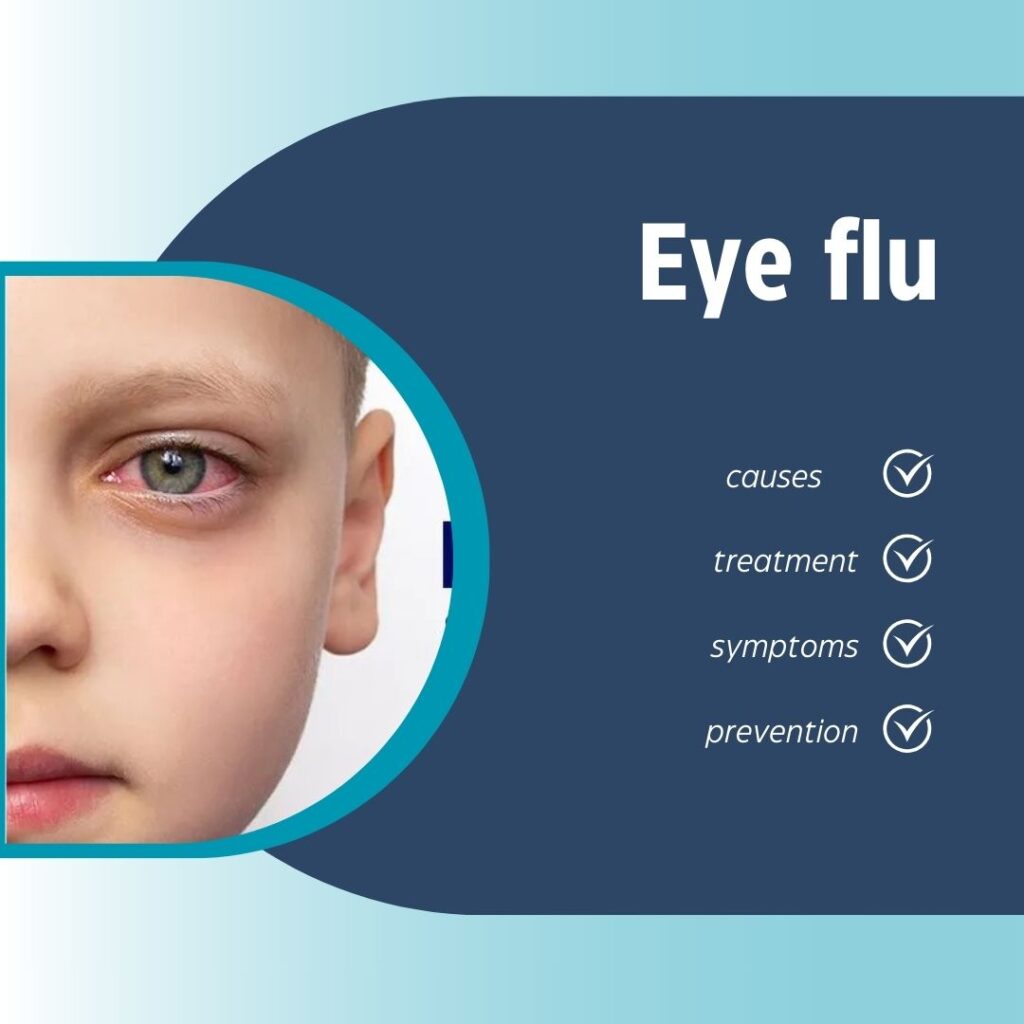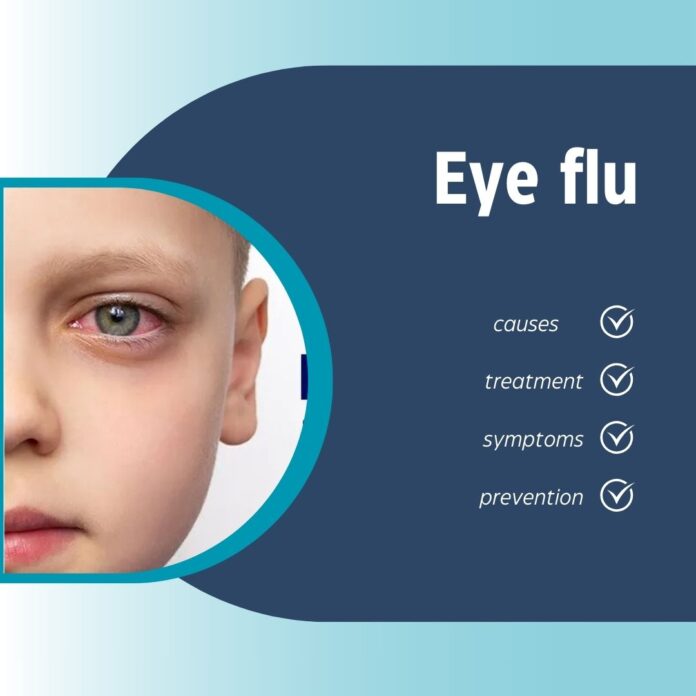Know about the common symptoms of eye flu, its causes, treatment methods and prevention measures. Identify the disease in time and protect your eyes from infection.
Eye flu is a common disease which is also called Netra Shodh in Hindi. Generally we can call it an eye infection. Due to which the outer layer of the eyes (conjunctiva) gets swollen. It starts with symptoms like irritation, redness and watering in the eyes. This disease is an infection. Therefore it is very important to recognize the symptoms of eye flu quickly. Once it happens to a person, it spreads easily to another person.

Therefore it is very important to treat this disease on time. Along with this, it is also very important to be careful so that others can also be saved from this disease.
What is eye flu?
Eye flu, which is also called Netra Shodh, in which there is an infection in the outer membrane of the eyes (conjunctiva). Due to which, along with the problem of swelling, the eyes start getting red, burning, itching and watering. This is a common disease but it is a very contagious disease. Which happens to people especially during the monsoon season.
Types of eye flu
1. Viral eye infection
This is caused by a virus, which is one of the most common types. Which spreads very fast.
2. Bacterial eye infection
This is especially caused by a bacteria in which there is usually a yellow or green discharge on the eyes.
3. Allergic eye infection
This is caused by any allergy, such as dust, pollen, smoke or other factors. It is not contagious.
Reasons for the spread of eye flu
- By coming in contact with any infected person (such as shaking hands, using the same clothes, any type of object that is shared with each other)
- It also spreads by repeatedly touching or rubbing your eyes.
- When coming in contact with any kind of infected water or contaminated water environment. The things to be careful about are that you keep your eyes clean and careful so that you can avoid infection.
Know about the symptoms of eye flu
The symptoms of eye flu (eye infection) start appearing in a few days, it depends on different types of infections. Its different types of symptoms are explained in detail.
- Redness of eyes:- In this, swelling starts appearing on the white layer of the eyes and the eyes appear red.
- Burning or itching:- In this, there is a constant complaint of burning or itching in the eyes.
- Watery or sticky discharge:- Water flowing from the eyes or yellow/green pus coming out.
- Swelling of eyelids:- In this, due to infection, there is swelling in the upper or protruding parts of the eyes.
- Sensitivity to light:- Feeling of stinging or discomfort in the eyes as soon as you read suddenly or in bright light.
- A special type of layer deposited on the eyelids:- This problem is seen when you wake up in the morning. In which a dry layer or glue-like substance sticks on the eyelids.
- Blurred vision/clear vision:- In some cases, patients have slightly blurred vision.
Some things to note
You can find out about its diseases from the symptoms mentioned above, but there are some cases in which the symptoms of eye flu can be slightly different according to the cause.
- In viral eye infection, generally watery fluid comes out due to which it spreads rapidly.
- In bacterial eye infection, there is thick fluid and sticky discharge in the eyes.
- In allergic eye infection, itching starts increasing but it is not an infection of any kind. If anyone you know shows these symptoms, then you should immediately contact the doctor because if it is not taken care of in time, it can turn into a serious problem.
Main causes of eye flu
Eye flu can happen due to many reasons. Among these, the most common causes are infection and allergy. The main causes of this disease are described in detail below.
Viral infection
Viral eye infection is one of the most common types. And it is also the most common infection. It can usually occur with cold or throat infections. And the most important thing is that it spreads very fast from one person to another.
Bacterial infection
There is a risk of eye infection due to a type of bacteria like staphylococcus and streptococcus. In this type of problem, thick liquid, yellow or green discharge comes out of the eyes. This is also an infection. If it is treated, then antibiotics may be required.
Allergy
One of the most important reasons is that this problem occurs quickly, such as smoke, chemicals, pollution or chlorinated water (such as in swimming pools) can also cause irritation to the eyes and an important cause of eye inflammation. In such cases, symptoms of allergic reaction are seen.
Precautions to be taken
If you have any such disease or frequent eye infection, then definitely consult an eye specialist. Because if we do not identify it on time, then it can become a serious problem later.
Ways to diagnose eye flu
Eye flu is usually diagnosed based on its symptoms after examination. But in some cases, the doctor can also do additional tests for it. This is especially done when it seems that this infection has been there for a long time. Or a person is facing this problem regularly.
When should you go to the doctor for this
In such a situation, you should go to the doctor when
- There is severe pain or swelling in the eyes.
- Eyes are found sticky after waking up in the morning.
- You are having problems in seeing (blurred vision or stinging in light)
- Continuous dirty thick liquid discharge from the eyes.
- Burning sensation in the redness of the eyes and not getting cured for two-three days.
How do doctors confirm eye flu
1. Checking its symptoms: –
First of all, the doctor observes the symptoms of the eyes such as: redness, swelling, discharge, burning sensation etc.
2. General examination:-
This is a general eye examination procedure in which the doctor examines the condition of the eye surface or pupil with the help of a torch or a special instrument.
3. Eye swab test:-
If a person has a serious infection or if the infection is to be confirmed as bacterial or viral, then the doctor takes a swab from the eyes and sends it to the lab for testing.
4. Identification of allergy:-
During the examination, if the doctor suspects allergic eye infection, then he can ask about your allergy history. Or he can advise you to do an allergy test.
Note: With timely treatment and diagnosis, it can be cured as soon as possible. Apart from this, others can also be saved from this infection.
Treatment of eye flu
Eye flu is treated on the basis of its symptoms (eg: viral, bacterial or allergic). Generally, mild cases can be cured with home remedies. Whereas serious problems or infections should be treated with the advice of a doctor.
Home remedies
- Eye cleaning
After waking up in the morning, gently clean the eyes with warm or lukewarm water and cotton. Keep in mind that whenever you clean, use new cotton only.
- Cold bandage
Soaking clean cloth in cold water and applying it on the eyes provides relief from swelling and irritation.
- Cleanliness and rest
Give ample rest to the eyes, do not rub them. Especially do not share your towel or handkerchief with anyone.
Eye drops or over the counter
- If you get relief from irritation or itching with over-the-counter eye drops in case of infection or allergy, then you can use it.
- Whenever you use it, do so only after consulting a pharmacist or doctor.
Antibiotic drops
- If you have a bacterial infection, then the doctor can give you antibiotic medicine or prescribe an ointment.
- It is necessary to complete it for the full duration.
Antihistamine drops
- If you have this infection due to allergy, then the doctor advises you to take antihistamine (preventive) drops.
- Through these, itching and swelling in the eyes is reduced.
Special precautions
- Do not use steroid-containing eye drops or any other type of eye drops without consulting a doctor.
- If there is no improvement in your symptoms, you must consult an eye specialist.
Measures to prevent eye flu
- Wear glasses in dusty or polluted environments.
- Wash hands frequently and pay special attention to cleanliness.
- Do not touch the eyes repeatedly.
- Do not share a towel, handkerchief, pillow or cosmetics with anyone.
- Keep a distance from the infected person. By keeping these simple measures in mind, you can protect yourself and others from the problem of eye flu.
When should you see a doctor
Usually, eye flu gets cured in a few days. But in some cases, it may take some extra time, in such a situation, you need to consult a doctor immediately.
You should contact a doctor in the following cases
- If there is severe pain or excessive swelling in the eyes.
- You have trouble seeing, such as blurred vision or discomfort with light.
- Continuous foul-smelling discharge is coming out of the eyes.
- If there are symptoms of fever or other infections in the body.
- Also, these symptoms do not improve after 3-4 days or the condition starts worsening.
Frequently Asked Questions (FAQs)
Q. Is eye flu an infectious disease?
Ans.Yes, eye flu (especially a viral and bacterial type) is a rapidly spreading infectious disease, especially when it spreads quickly by coming in contact with an infected person or by sharing things like towels, handkerchiefs, touching or rubbing the eyes.
Q.How many days can eye flu last?
Ans.Eye flu usually gets cured in 5-7 days but in some cases it can last up to 10 days. In such cases you should contact an eye specialist.
Q.Should you go out of the house after getting eye flu?
Ans.Absolutely not, in such cases you should rest at home. Until this disease is completely cured. This poses a risk of spreading the disease.
Conclusion
Through this article, we learned about eye flu in detail. Eye flu is a common disease but it is an eye infection. We have discussed its main symptoms like redness in the eyes, irritation, watering or pus in the eyes. All these symptoms are included.
It is important to identify this infection early and treat it at the right place in time. Because initially people ignore it thinking it to be a normal disease. But in some cases it can cause a very serious problem. However, by treating it at the right time, the eyes can be saved.
Especially taking care of cleanliness, keeping distance from others, as well as preventing its spread is the right treatment. If you feel that the problem is serious then you should go to an eye specialist as soon as possible and get it checked. With the right information, caution and timely treatment, you can keep your eyes healthy.
Send feedback
Read also:How much does laser eye surgery cost in 2025? a complete break downhttps://imhoro.com/how-much-does-laser-eye-surgery-cost-in-2025-a-complete-break-down/
facebook:imhoro community https://www.facebook.com/profile.php?id=61575370258519
written by Suraj Horo

